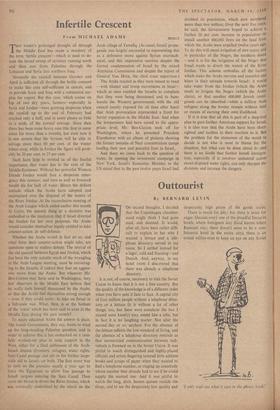Infertile Crescent
From MICHAEL ADAMS BEIRUT rr His winter's prolonged drought all through I the Middle East has made a mockery of the term 'fertile crescent'—which is used to de- note the broad sweep of territory running north and then east from Palestine through the Lebanon and Syria into northern Iraq.
Normally the rainfall between October and April is sufficient all through the fertile crescent to make this area self-sufficient in cereals, and to provide Syria and Iraq with a substantial sur- plus, for export. But this year, which comes on 'top of two dry years, farmers--especially in Syria and Jordan—were growing desperate when the rainfall up to the end of February had reached only a half, and in some places as little as a sixth, of the normal average. Since then there has been some heavy rain (the first in some areas for more than a month), but even now it is not certain that the Syrians will be able to salvage more than 60 per cent. of the winter wheat crop, while in Jordan the figure will prob- ably be 20 per cent. to 25 per cent.
Such facts help to remind us of the fearful importance that water has in the eyes of the Middle-Easterner. Without her powerful Western friends Jordan would face a desperate emer- gency this summer, and men as well as livestock would die for lack of water. Hence the defiant attitude which the Arabs have adopted and maintained over the disposal of the waters of the River Jordan. At the inconclusive meeting of the Arab League which ended earlier this month in Cairo, the nearest thing to a decision was embodied in the resolution that if Israel diverted the Jordan for her own purposes, the Arabs would consider themselves legally entitled to take counter-action in self-defence.
Whether the Arabs would in fact do so, and what form their counter-action might take, are questions open to endless debate. The revival of the old quarrel between Egypt and Jordan, which has been the only notable result of the wrangling in the Arab League meeting, must be encourag- ing to the Israelis, if indeed they fear an aggres- sive move from the Arabs. But whatever Mr. Ben-Gurion may have said in Washington, very few observers in the Middle East believe that he really feels himself threatened by the Arabs, or that the Arabs feel themselves strong enough — even if they could unite—to take on Israel in a full-scale war. What, then, is at the bottom of the `crisis' which has been said to exist in the Middle East during the past month?
To many educated Arabs the answer is plain. The Israeli Government, they say, wants to wind up the long-standing Palestine question, and in order to achieve this it has embarked on a care- fully worked-out plan to raise support in the West, either for a final settlement of the Arab- Israeli dispute (frontiers, refugees, water rights, Suez Canal passage and all) or for further large- scale aid to Israel--or both. The first move was to turn on the pressure nearly a year ago to force the Egyptians to allow free passage to Israeli cargoes entering the Suez Canal. Then came the threat to divert the River Jordan, which was eventually underlined by the attack on the Arab village of Tawafiq. (As usual, Israeli propa- ganda was largely successful in representing this as a defensive move against Syrian encroach- ment, and this impression survives despite the formal condemnation of Israel by the mixed Armistice Commission and despite the report of General Van Horn, the chief truce supervisor.) The Arabs reacted as they were meant to react —with bluster and troop movements in Sinai— which at once enabled the Israelis to complain that they were being threatened and to bam- boozle the Western governments with the old canard. (surely exposed for all time after Suez) that Arab provocation represented a front for Soviet expansion in the Middle East. And when the temperature had been raised to the appro- priate level, Mr. Ben-Gurion took off for Washington, where he presented President Eisenhower with an album of pictures showing the former inmates of Nazi concentration camps leading their new and peaceful lives in Israel, And there we come back to the question of water. In opening the investment campaign in New York, Israel's Economic Minister to the US stated that in the past twelve years Israel had doubled its population, which now numbered more than two million. Over the next five years, he said, the Government hoped to achieve a further 20 per cent. increase in population—to install another 400,000 Jews on the land from which the Arabs were expelled twelve years ago. To do this will mean irrigation of new areas, and in particular of the Negev, the southern desert —and it is for the irrigation of the Negev that Israel wants to divert the waters of the River Jordan. This scheme embodies all the factors which make the Arabs nervous and resentful and bitter in their attitude towards Israel: it would take water from the Jordan (which the Arabs need) to irrigate the Negev (which the Arabs claim), so that another 400,000 Jewish immi- grants can be absorbed—while a million Arab refugees along the border remain without land or means of earning their own livelihood.
If it is true that all this is part of a deep-laid plan to gain further American support for Israel, it is also true that the Arabs have been short- sighted and tactless in their_ reaction to it. But the problem for the statesmen of the world to decide is not who is most to blame for the situation, but what can be done about it—and there is no doubt that further Israeli immigra- tion, especially if it involves unilateral action about disputed water rights, can only sharpen the divisions and increase the dangers.


































 Previous page
Previous page